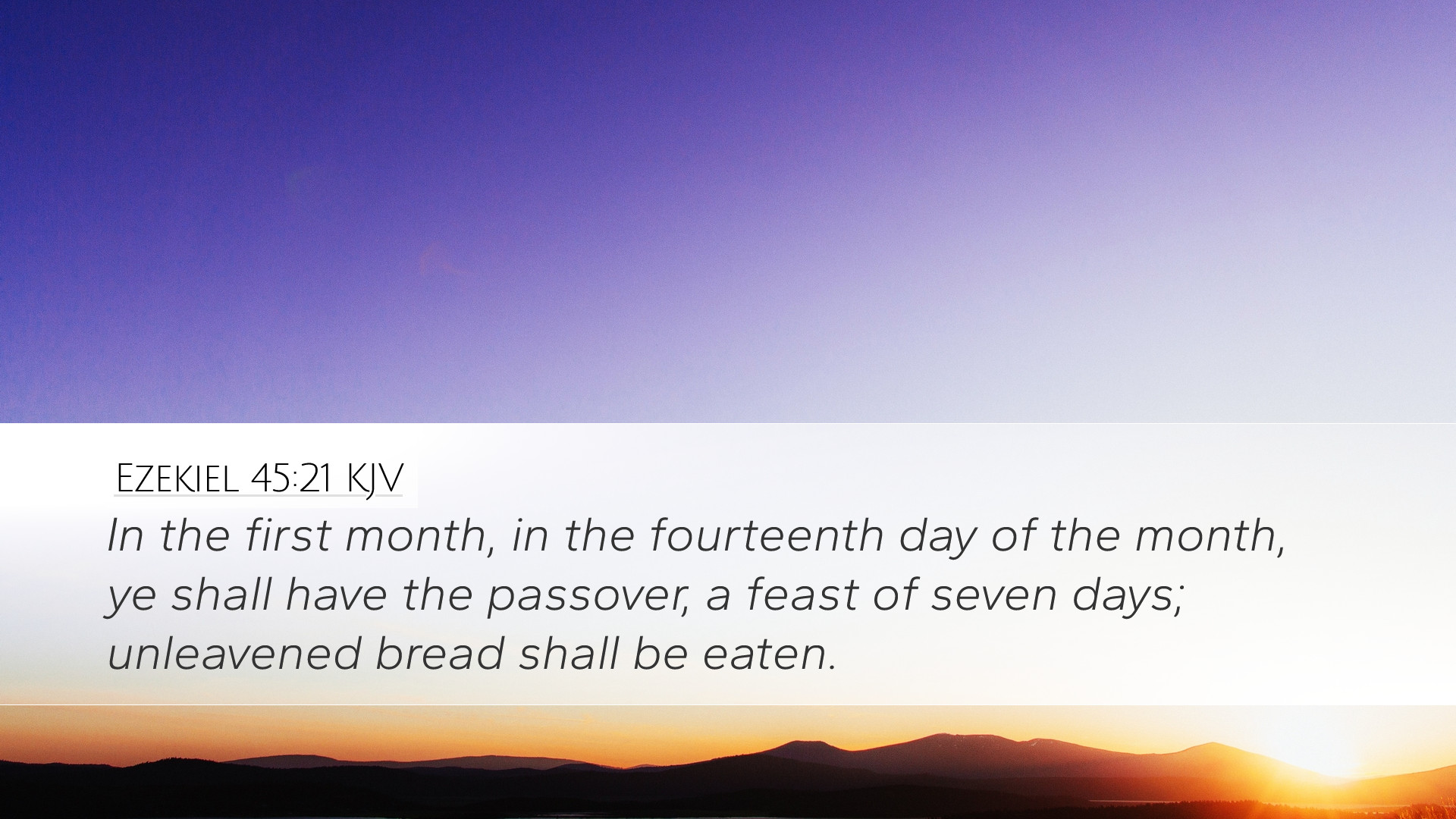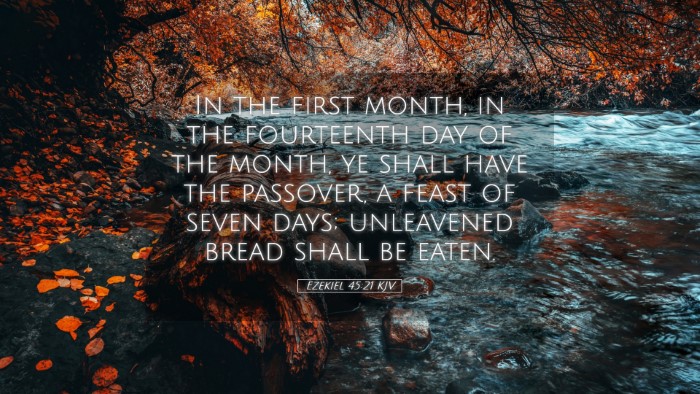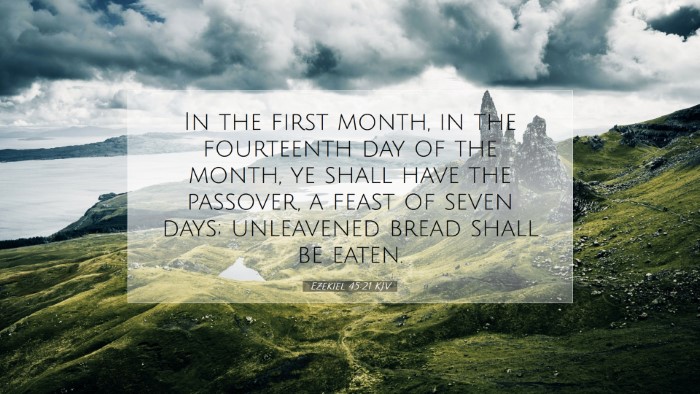Bible Commentary on Ezekiel 45:21
Verse Text: "In the first month, on the fourteenth day of the month, you shall have the Passover, a feast of seven days; unleavened bread shall be eaten." (Ezekiel 45:21)
Introduction
The prophecy of Ezekiel presents a visionary blueprint for the restoration of Israel, replete with instructions for worship, governance, and communal life. In this particular verse, God commands the observance of the Passover, emphasizing its significance in the national and spiritual life of Israel. Understanding the context, historical setting, and the theological implications of this command is crucial for pastors, students, and theological scholars.
Historical Context
The book of Ezekiel was written during Israel's exile in Babylon, a time when the temple and national identity were under threat. This exile period necessitated the reaffirmation of identity, worship, and practice among the Jewish people. The Passover, a feast commemorating God's deliverance of Israel from Egyptian bondage, stands central in Israel's historical identity. By commanding its observance, Ezekiel reestablishes not just a liturgical practice but a reminder of God's covenant faithfulness.
Insights from Public Domain Commentaries
Matthew Henry's Commentary
Henry emphasizes the typical role of the Passover in symbolizing deliverance. He notes that the observance of this feast under the reformed order pointed not only to past events but also anticipates Christ's ultimate sacrifice as the true Passover Lamb (1 Corinthians 5:7). He elaborates on the necessity of the feast lasting seven days, which signifies a complete or perfect redemption. The duration of the feast enhances its importance, drawing attention to the need for continuous remembrance in the hearts of believers.
Albert Barnes' Notes
Barnes elucidates the specificity of the month and day, underscoring the ordinal precision with which God desires His people to remember and celebrate important events. This specificity is not trivial; it signifies God's ordering of time and events for His redemptive plan. He further notes that the mention of unleavened bread is of paramount significance, as it symbolizes purity and the necessity of removing sin from our lives as part of coming to God. This should resonate with the New Testament teachings about the necessity of righteousness and the rejection of sin (Luke 12:1).
Adam Clarke's Commentary
Clarke provides a detailed exploration of the Passover's historical roots, describing how the feast serves as both a commemoration of liberation and a paradigm of redemption. He presents the Passover as an annual time that reinvigorates faith and reminds the Israelites of their covenant relationship with God. Clarke's analysis reveals how the observance of such feasts fosters a collective memory among the people, strengthening their identity as God's chosen ones throughout generations.
Theological Implications
The significance of Ezekiel 45:21 extends beyond a mere instruction for observance; it contains profound theological implications for both the ancient and contemporary reader. Here are several key points to consider:
-
Covenant Faithfulness:
The observance of the Passover serves as an acknowledgment of God’s unwavering faithfulness to His covenant promises. It beckons Israel to remember their identity as His people and reinforces their reliance on His grace for redemption.
-
Identity Formation:
Celebrating the Passover fosters a strong communal and individual identity. It is an act of remembrance that shapes the cultural and spiritual framework of the Israelites, showcasing their unique relationship with God.
-
Typological Significance:
In Christian theology, the Passover prefigures Christ's sacrificial death. The exodus narrative and its associated rituals find their fulfillment in the New Testament, where Christ becomes the ultimate Passover Lamb. This typology invites believers to reflect on how Old Testament practices point to New Testament realities.
-
Liturgical Reflection:
The prescribed observance of this feast underscores the importance of ritual in the believer's life. Liturgical observance can promote spiritual formation, guiding individuals in their expression of faith and relationship with God.
Practical Applications for Pastors and Scholars
As we reflect on Ezekiel 45:21, let us consider the following applications:
-
Encouraging Remembrance:
Pastors should encourage their congregations to remember their spiritual heritage. The practice of communion, rooted in the Passover, should be viewed not only as a ritual but as a powerful reminder of God's grace through Christ.
-
Teaching on Identity:
Fostering a strong theological understanding of Christian identity in Christ is crucial. A pastor's teaching can help believers recognize their place in God's redemptive story.
-
Emphasizing Holiness:
The call to remove leaven symbolizes a deeper spiritual truth. Teaching on sanctification and the pursuit of holiness can help congregations grasp the importance of living lives that reflect God's character.
-
Promoting Community:
Encourage communal activities that allow members to participate in remembrance together. Pastors can facilitate gatherings that reflect on God’s faithfulness, thus strengthening the bonds of fellowship among believers.
Conclusion
Ezekiel 45:21 serves as a rich source of wisdom and significance for today's church. Through the careful study of this verse, alongside insights from public domain commentaries, we gain a deeper appreciation for the meanings embedded therein. It is a testament to the continuity of God’s salvation plan that transcends history, invites personal and communal renewal, and challenges contemporary believers to practice memorial observances that deepen faith and foster communal identity. May we always look back at our Passover with wonder and forward to the ultimate fulfillment found in Christ.


